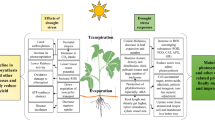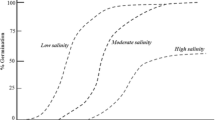Abstract
The effect of abscisic acid (ABA) on heat and salt resistance of cucumber seedlings exposed (consecutively or simultaneously) to high temperature and chloride was studied. Exogenous ABA proved to additionally increase the heat and salt resistance after both consecutive and simultaneous exposure of cucumber seedlings to 38∞N and NaCl. The involvement of this hormone in the common (nonspecific) mechanisms increasing plant resistance to the studied environmental factors is concluded.
Similar content being viewed by others
References
Aleksandrov, V.Ya., Cytophysiological and Cytoecological Studies on Plant Cell Resistance to High Temperatures, Tr. Botan. In-Ta AN SSSR, 1963, vol. 4, pp. 234–280.
Alexieva, V., Ivanov, S., Sergiev, I., and Karanov, E., Interaction between Stresses, Bulg. J. Plant. Physiol., 2003, vol. XXIX, pp. 1–17.
Balagurova, N.I., Akimova, T.V., and Titov, A.F., The Effect of Local Cooling of Cucumber and Wheat Seedlings on Various Kinds of Stress Resistance of Their Leaves and Roots, Fiziol. Rastenii, 2001, vol. 48, pp. 113–118.
Brilkina, A.A., Prooxidant-Antioxidant Balance in Plants Exposed to Hyperthermia and Exogenous Phytohormones, Extended Abstract of Cand. Sci. (Biol.) Dissertation, Nizhnii Novgorod: Nizhegor. Univ., 2002.
Chen, C.C.S. and Plant, A.L., Salt-Induced Protein Synthesis in Tomato Roots: The Role of ABA, J. Exp. Bot., 1999, vol. 50, pp. 677–687.
Chirkova, T.V., Fiziologicheskie osnovy ustoichivosti rastenii (Physiological Bases of Plant Resistance), St. Petersburg: St. Petersburg State Univ., 2002.
Cowan, A.K., Richardson, G.R., and Maurel, J.C.G., Stress-Induced Abscisic Acid Transients and Stimulus-Response Coupling, Physiol. Plant., 1997, vol. 100, pp. 491–499.
Gong, M., Li, Y.-J., and Chen, S.Z., Abscisic Acid Induced Thermotolerance in Maize Seedlings Is Mediated by Ca2+ and Associated with Antioxidant Systems, J. Plant Physiol., 1998, vol. 153, pp. 488–496.
Grillo, S., Leone, A., Xu, Y., et al., Control of Osmotin Gene Expression by ABA and Osmotic Stress in Vegetative Tissues of Wild-Type and ABA-Deficient Mutants of Tomato, Physiol. Plant., 1995, vol. 93, pp. 498–504.
Gueta-Dahan, Y., Yaniv, Z., Zilinskas, B.A., and Ben-Hayyim, G., Salt and Oxidative Stress: Similar and Specific Responses and Their Relation to Salt Tolerance in Citrus, Planta, 1997, no. 4, pp. 460–469.
Hale, H.B., Cross Adaptation, Environ. Res., 1969, no. 2, pp. 423–434.
Hare, P.D., Cress, W.A., and van Staden, J., Proline Synthesis and Degradation: A Model System for Elucidating Stress-Related Signal Transduction, J. Exp. Bot., 1999, vol. 50, pp. 413–434.
Jennings, P. and Saltveit, M.E., Temperature and Chemical Shocks Induce Chilling Tolerance in Germinating Cucumis sativus (Cv. Poinsett 76) Seeds, Physiol. Plant., 1994, vol. 91, pp. 703–707.
Kosakovskaya, I.V. and Maidebura, E.V., Phytohormonal Regulation of Plant Adaptation: The Role of Abscisic Acid in Stress Resistance, Fiziol. Biokh. Kul’t. Rast., 1989, vol. 21, pp. 315–321.
Kuznetsov, V.V. and Shevyakova, N.I., Stress Response of Tobacco Cells to High Temperature and Salinity. Proline Accumulation and Phosphorylation of Polypeptides, Physiol. Plant., 1997, vol. 100, pp. 320–326.
Kuznetsov, Vl.V., Khydyrov, B.T., Roshchupkin, B.V., and Borisova, N.N., General Systems of Cotton Plant Resistance to Salt and High Temperature Stress: Facts and Hypotheses, Fiziol. Rastenii, 1990, vol. 37, pp. 987–996.
Kuznetsov, Vl.V., Rakitin, V.Yu., and Zholkevich, V.N., Effects of Preliminary Heat-Shock Treatment on Accumulation of Osmolytes and Drought Resistance in Cotton Plants During Water Deficiency, Physiol. Plant., 1999, vol. 107, pp. 399–406.
Mittler, R., Oxidative Stress, Antioxidants, and Stress Tolerance, Trends Plant Sci., 2002, vol. 9, pp. 405–410.
Rizhsky, L., Liang, H., and Mittler, R., The Combined Effect of Drought Stress and Heat Shock on Gene Expression in Tobacco, Plant Physiol., 2002, vol. 130, pp. 1143–1151.
Ryu, S.B., Costa, A., Xin, Z., and Li, P.H., Induction of Cold Hardiness by Salt Stress Involved Synthesis of Cold and Abscisic Acid-Responsive Proteins in Potato (Solanum commersonii Dun.), Plant Cell Physiol., 1995, vol. 36, pp. 145–151.
Sabehat, A., Weiss, D., and Lurie, S., Heat-Shock Proteins and Cross-Tolerance in Plants, Physiol. Plant., 1998, vol. 103, pp. 437–441.
Talanova, V.V., Titov, A.F., Minaeva, S.V., and Soldatov, S.E., Separate and Combined Effect of Salt and Hardening Temperatures on Plants, Fiziol. Rastenii, 1993, vol. 40, pp. 584–588.
Talanova, V.V., Titov, A.F., and Boeva, N.P., Abscisic Acid Level in Plant Leaves Changes under the Influence of Cold and Heat Hardening, Fiziol. Rastenii, 1991, vol. 38, pp. 991–997.
Talanova, V.V., Titov, A.F., and Boeva, N.P., Plant Response to Lead Ions and Unfavorable Temperature, Dokl. RSKhA, 1996, no. 5, pp. 5–7.
Wei, J.-Z., Tirajoh, A., Effendy, J., and Plant, A.L., Characterization of Salt-Induced Changes in Gene Expression in Tomato (Lycopersicon esculentum) Roots and the Role Played by Abscisic Acid, Plant Sci., 2000, vol. 159, pp. 135–148.
Xiong, L., Ishitani, M., and Zhu, J.-K., Interaction of Osmotic Stress, Temperature, and Abscisic Acid in the Regulation of Gene Expression in Arabidopsis, Plant Physiol., 1999, vol. 119, pp. 205–211.
Author information
Authors and Affiliations
Additional information
Original Russian Text © V.V. Talanova, L.V. Topchieva, A.F. Titov, 2006, published in Izvestiya Akademii Nauk, Seriya Biologicheskaya, 2006, No. 6, pp. 757–761.
Rights and permissions
About this article
Cite this article
Talanova, V.V., Topchieva, L.V. & Titov, A.F. Effect of abscisic acid on the resistance of cucumber seedlings to combined exposure to high temperature and chloride. Biol Bull Russ Acad Sci 33, 619–622 (2006). https://doi.org/10.1134/S1062359006060136
Received:
Issue Date:
DOI: https://doi.org/10.1134/S1062359006060136




